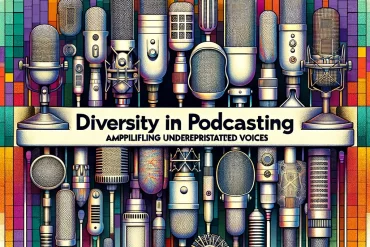In a world where media often reflects a narrow spectrum of experiences, podcasting has emerged as a powerful platform for amplifying underrepresented voices. This democratic medium allows anyone with a story to tell or an insight to share, regardless of their background, to reach a global audience. Podcasting’s low entry barrier and widespread accessibility have enabled a diverse array of voices to be heard, challenging traditional narratives and enriching our collective understanding.
The beauty of podcasting lies in its inherent diversity. Unlike mainstream media, which is often constrained by commercial interests and homogeneity, podcasts can cater to a myriad of interests, cultures, and perspectives. This diversity is not just about race or gender; it encompasses a wide range of experiences, including those of different socioeconomic backgrounds, sexual orientations, abilities, and more. Each unique voice adds depth and richness to the tapestry of human experience shared through audio storytelling.
One of the secrets to podcasting success is authenticity. Listeners are drawn to real stories and genuine voices. Podcasts hosted by individuals from underrepresented groups often resonate deeply with audiences because they offer perspectives that are seldom heard in other media formats. These podcasts not only entertain but also educate and foster empathy, breaking down barriers and challenging stereotypes.
Another aspect of podcasting that encourages diversity is its community-centric nature. Podcast creators often engage directly with their listeners, creating a feedback loop that is more intimate and responsive than traditional media. This engagement fosters a sense of community and belonging among listeners who may feel marginalized or overlooked elsewhere.
Podcast networks and platforms also play a crucial role in promoting diversity. By featuring and promoting podcasts from diverse creators, these platforms can help bridge the gap between underrepresented voices and a wider audience. Initiatives to support and fund podcasts by creators from minority groups are essential in leveling the playing field.
However, challenges remain. Discoverability can be a significant hurdle for new podcasters, especially those without the backing of large networks or media conglomerates. Navigating the technical aspects of podcasting can also be daunting for newcomers. Resources like Secrets to Podcasting provide invaluable guidance for those starting out, offering tips on everything from recording quality audio to effectively marketing a podcast.
Education and mentorship are vital in supporting diverse voices in podcasting. Workshops, webinars, and online communities can provide aspiring podcasters with the skills and confidence they need to share their stories. Established podcasters and industry professionals have a role to play in mentoring and supporting new voices, ensuring a more diverse range of experiences and stories are represented in the medium.
In conclusion, podcasting represents a beacon of hope for diversity in media. Its accessibility, combined with the authenticity of its creators, allows for a more inclusive and representative media landscape. By supporting and amplifying underrepresented voices, we enrich our collective understanding and foster a more empathetic and connected world. The growth of podcasting is not just about entertainment; it’s about giving a voice to those who have long been unheard, and in doing so, reshaping the narrative of our society for the better.



